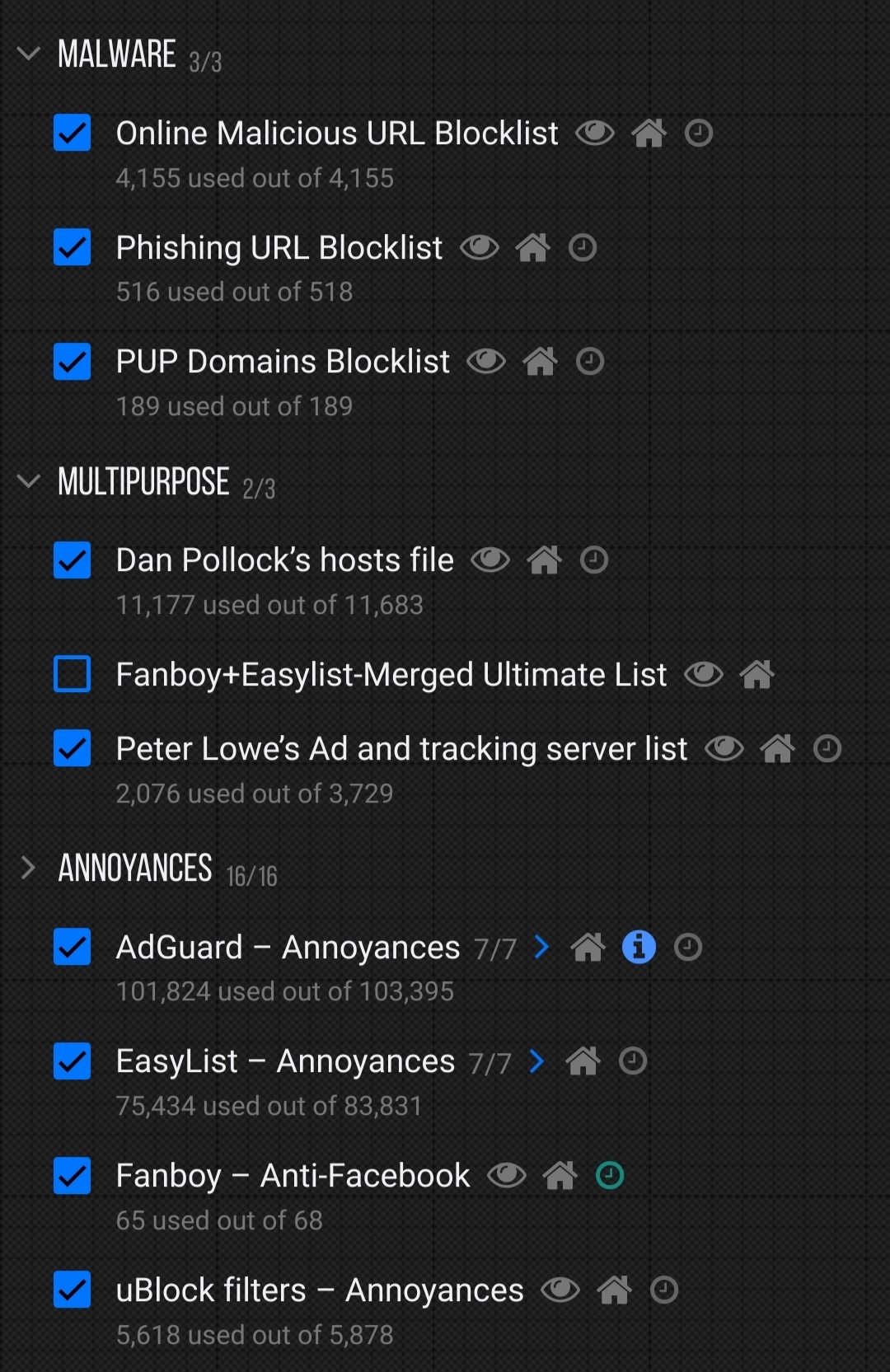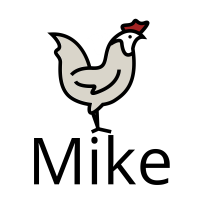- cross-posted to:
- technology@lemmy.world
- cross-posted to:
- technology@lemmy.world
The new MV3 architecture reflects Google’s avowed desire to make browser extensions more performant, private, and secure. But the internet giant’s attempt to do so has been bitterly contested by makers of privacy-protecting and content-blocking extensions, who have argued that the Chocolate Factory’s new software architecture will lead to less effective privacy and content-filtering extensions.
For users of uBlock Origin, which runs on Manifest V2, “options” means using the less capable uBlock Origin Lite, which supports Manifest V3.
Hey that’s a great reason for many to move to Firefox, even for normal users
I wish it had a cleaner UI
What do you mean by clean? Firefox UI is highly customizable, you can even add spacing where you want it, or select a more compact view
You can even customize it with userChrome.css
No one does that outside of a handful of users
Regardless of how many people do it, you can do it. Then you can have the “clean” interface you want
cleaner UI
It’s a browser, with a tab bar and hamburger menu to access settings. A plain, boring, 2024 design web browser.
And that’s exactly what it should be. Use the least amount of screen space to give me the information and buttons I need to navigate, and get the fuck out of my way. Provide a way to use plugins to alter and block ads effectively, and that’s literally all I need.
And this is how both Firefox and Chrome looks like.
I’m always confused when people talk about browser design/UI for exactly this reason. Regardless of browser, 95% of your screen is the same. Why would you even care what the default theme is? Not to mention themes are super customizable
Except it is HUGE
You can actually make it look exactly like Chrome, Safari, whatever you want with userChrome.css. Mine currently looks like Safari.

That’s not good for privacy
How so?
Maybe because it alters your maximized resolution, which makes you easier to identify? But that sounds like a bit of a stretch to me.
It makes you stand out
You’ll use Chrome on your Android like all the others and you’ll not complain 👁️🗨️
I’ve never had too many issues with it. It’s not bad imo
firefox is extremely customizable. I like the options, but you can make it yours and it’s way better than it was a few years ago, even faster than chrome.
Defaults matter
Manifest V3 is now supported to varying degrees by other browsers, such as Edge, Firefox, and Safari.
We have no idea how much Firefox is going to lick Google’s boots to get more money. Mozilla might end up just dropping manifest v2 too.
I really don’t see how supporting Manifest V3 is a problem. It’s still going to be used by many extension developers, and there’s no harm in its availability as long as you can still block WebRequest, which is currently the case. On the Mozilla taking Google’s money point, sure, that’s true, but it doesn’t seem to have affected too much of the browser, other than search defaults abd a few other things that can be very easily turned off or removed entirely. I wouldn’t say the chances are particularly high for Manifest V2 to be completely removed, personally.
Manifest v3 has an upper limit of rules that can be implemented, so if you don’t see how supporting it is a problem, you’re blind.
Supporting v3 and v2 inevitably leads to v2 support being dropped. Firefox has done this plenty in the past with the goal of “cleaning up the code base”. Taking care of 1 code path > Taking care of 2 code paths.
It’s simple on the face of it, and all results in less control for web users.
Firefox’s implementation of manifest v3 is a bit different than Chrome’s, and still allows for blocking webrequests with no upper limit.
https://blog.mozilla.org/addons/2024/03/13/manifest-v3-manifest-v2-march-2024-update/
https://blog.mozilla.org/addons/2022/05/18/manifest-v3-in-firefox-recap-next-steps/
I for one welcome Mozilla’s use of embrace, extend, exterminate.
deleted by creator
The way Mozilla’s going, nothing would surprise me. They care about Google money, and that’s it.
Got a source on that one? Because the changes they’re (not) making don’t make it seem like they’re bowing down to Google.
What is the Anti Commercial-Al license and why do people keep adding it to their comments?
“I DO NOT GRANT PERMISSION TO LAW ENFORCEMENT TO READ THIS COMMENT. ANY USE OF THIS COMMENT BY LAW ENFORCEMENT FOR ANY REASON IS ILLEGAL. THIS COMMENT CANNOT BE USED AS EVIDENCE AGAINST ANY NON-LAW ENFORCEMENT PERSONS IN RELATION TO ANY CRIME.”
Why would Mozilla do that? I guess only if Google gave them an ultimatum because they do give Mozilla a lot of money
I assume they just support both with no plans to phase out v2
Firefox’s implementation of manifest v3 doesn’t come with the same restriction as Google’s. Ad blockers will still work with manifest v3 on Firefox (but not on chrome).
This means that all manifest v3 extensions made for Chrome work with Firefox, and almost all manifest v3 extensions made for Firefox will work with Chrome.
Ah; but do they have plans /not/ to phase out v2?
Because if they don’t, phasing it out will eventually be the easiest way to maintain their codebase and performance.
A lot is kind of an understatement:
“In 2022, 81% of Mozilla’s revenues were derived from Google”
https://assets.mozilla.net/annualreport/2022/mozilla-fdn-2022-fs-final-0908.pdf
With that level of support, I don’t think an ultimatum would be required.
Oh wow that’s much more than I thought
Because Mozilla is about money. They just have to be a bigger browser alternative to Chrome/Chromium than all the rest on Windows and Google will give them money to stay afloat. But if they don’t implement manifest v3, addon writers won’t be able to generate addons for both Chrome/Chromium and Firefox, meaning it will become less relevant and maybe another alternative will come in to take their place (their sweet sweet Google money).
If there’s any whiff of Google forcing Mozilla to do anything they’ll instantly be investigated for monopolistic abuse by the EU.
Hell, the whole reason why Google is paying Mozilla is to keep it alive to be able to say “see, we’re not the only browser left”. If Mozilla dies then Chrome would be under constant scrutiny.
They already support manifest v3, but with less restrictions than Chrome’s implementation.
Indeed, that’s what I quoted originally. What I’m saying is that them going the whole way wouldn’t be a surprise.
Just quit Chrome…
It’s all we can use at work besides Edge which is just a reskinned Chrome.
On my personal devices it’s 100% Firefox as they have great features like sharing pages between devices and extensions on the mobile browser.
You can’t use another Chromium based browser? Brave and Vivaldi will maintain support for Manifest v.2
Most IT places don’t let end users install software.
Petition the IT boffins about the loss of security when uBlock gets removed from chrome.
This is a large corporation and they laid off all the IT staff a few years ago in favor of outsourcing it to some far-off company.
OK, so we just need to make a Firefox that runs inside Chrome :)
What about un-Googled Chromium?
It’s still 100% dependent on Google doing development work.
No everything is managed by IT due to IP concerns. We don’t even have privileges to install programs on the computers.
Do you have WSL installed? If so, you can install Firefox in it and launch with a GUI, but there’s a massive performance penalty
I don’t think so. I’m assuming this would be more common in a programming type industry. We’re more of a R&D type manufacturing facility.
deleted by creator
They might maintain it for a while, but their whole business model is built on the idea that they don’t have to develop a browser themselves. The longer they maintain v2, the more they have to patch the main chromium release. Eventually it will be enough development time that they’ll give it up. It’s a company and they’ll only do something as long as it’s profitable.
I disagree, their entire business model is built on the idea that they are different from Chrome. Native Adblocker is a feature they advertise. People use their browsers because of this difference and will stop if this difference no longer exists.
Native adblocking is completely different from manifest v2. I agree that they will continue with their adblocking, however my point still stands.
Their best feature IMO has always been “not Microsoft” but now I’ll add “not Google” to that.
Just want to quote reddit users
“THIS”
take my upvote!!!
Include me in the screenshot
you, sir, have won the internet 😂
For those looking to move beyond Chrome, there are alternatives that come pre-installed with uBlock Origin and are considered better than Firefox:
This project is a custom and independent version of Firefox, with the primary goals of privacy, security and user freedom.
LibreWolf is designed to increase protection against tracking and fingerprinting techniques, while also including a few security improvements. This is achieved through our privacy and security oriented settings and patches. LibreWolf also aims to remove all the telemetry, data collection and annoyances, as well as disabling anti-freedom features like DRM.
The Mullvad Browser is developed – in collaboration between Mullvad VPN and the Tor Project – to minimize tracking and fingerprinting. It is designed to be used with a trustworthy VPN instead of the Tor Network. It does not require the use of Mullvad’s VPN.
Both have privacy and security enhancements that significantly affect performance and slightly convenience. Regular Firefox can be a better option for some of them. But the browsers you listed are still great
Performance? I’d expect it to be faster when running less stuff. What are they doing additionally that reduces performance?
lol I love the ‘anti commercial ai license’ footer that you think will do anything. Such a boomer move! Got any funny jokes to forward to me over email?
I think the point isn’t that the scrapper is NOT going to record their messages, but instead that it WILL regardless. Then making use of a training data unmasking exploit, the company (theoretical if the law sides with the individual) needs to fully retrain their model to remove the message text. This puts a lot if faith in copyright law, which is strong in the USA (and others) but rarely enforced to the benefit of small creators. Very little legal precedent.
Man the performance hit really is there, especially on HDDs. Content blocker kind of stuff is the reason I think. It’s basically like a real-time scanner
Compared to loading ads? Most people will see an overall speedup when blocking ads even with the extra overhead.
Idk for me it’s crazy slow. There’s even like severe input lag and unresponsiveness sometimes
librewolf is cool but I think it’s too privacy optimised for the average user, it often doesn’t keep you signed into sites (even with cookies enabled) and the ocsp things can be annoying sometimes
I tried it and because I 2FA everything, this is why I stopped. It also kept resetting my settings every time I tried to fix it. It lasted less than a week.
Switch to Firefox.
Just use Librewolf on desktop, Mull on your phone and be done with it
also I’d recommend Adnauseam instead of ublock. It’s based on ublock but clicks on ads inseatd of blocking them.
Basically a form of protest against surveillance capitalism and obfuscation against it’s methods.How does clicking on ads protest against them? Doesn’t that just give even more money to the ad networks (and Google)?
I think it overinflates the click rate, which means despite having more clicks on an ad, that doesnt mean that more people bought some product. This devalues click rate which might make the ad service less valuble to advertisers, so they dont spend as much on Google’s ad service.
And in general I think makes any training data for a model more muddy, since adnauseum isnt behaving like a human. So it could make it more difficult to train models that do targeted advertising.
- Company buys 1000 clicks
- Adnauseam user click on 100 of them
- Company only bought 900 real clicks
- If 1% of the people who click, buy, then they only get 9 buyers instead of 10
- Company observes that 0.9% of people who click, actually buy
- A click isn’t as valuably as before.
- To generate 10 clicks, the company has to buy 1100 clicks in order to get the 10 paying customers in order to finance the ads
- More ads lead ro more people using adblocker, the more adblock users, the more adnauseam users. The more adnauseam users, the less valuable the ads.
- adnauseam usera click more often and faster on ads. If there is a critical mass of adnauseam users, the ads become even more worthless as real people do not get the chance of clicking on it, skewing the curve even further.
- As ads become useless because people don’t buy after a click, companies stop paying for ads in that space.
- Only companies that can differentiate between real users and adnauseam bots like within proprietary apps like tiktok and instagram can generate money.
- Is it really that useful?
- achtually 1111 (as the new 100 will be targeted as well and so on)
🙂
Was wondering…
If I would invest $10 a month … How many computing power I could get … For an Adnauseam-As-A-Service server … And how many ad-budget that would vaporize?
Would it make $100, $1000 or more ad budget worthless?
Just curious what the numbers would be?
From their website:
As online advertising becomes ever more ubiquitous and unsanctioned, AdNauseam works to complete the cycle by automating ad clicks universally and blindly on behalf of its users. Built atop uBlock Origin, AdNauseam quietly clicks on every blocked ad, registering a visit on ad networks’ databases. As the collected data gathered shows an omnivorous click-stream, user tracking, targeting and surveillance become futile.
AdNauseam is a free browser extension designed to obfuscate browsing data and protect users from tracking by advertising networks. At the same time, AdNauseam serves as a means of amplifying users’ discontent with advertising networks that disregard privacy and facilitate bulk surveillance agendas.
Does Adnauseam it actually work? Just installed it and tried to browse the most ad-infested DDL and porn sites possible : saw all the ads.
Just like with ublock you have to configure it a bit, especially the blocklists
here is my setup:
(you can also import additional lists, these are rly cool https://github.com/bogachenko/fuckfuckadblock )




Never had to configure anything with ublock…
So how big an exodus to Firefox are we looking at here?
Companies and communities should just pull support for Chrome. It would mean a loss in market share but at the end of the day it would get some attention if everyone did it.
At this point Google just want mozilla to be over them
Just some minor changes
Is Firefox affected?
Nope.
times like these i wish we still had trident/edgehtml edge. it might not have been the best but at least it would be another engine other than gekko (let’s face it webkit is a non factor)
I would suggest reading this before switching to Firefox/Waterfox/Librewolf. DNS blocking and userscripts will get you a long way on browsers that lack extensions (qutebrowser, falkon, luakit).
This is the best summary I could come up with:
"Users will be directed to the Chrome Web Store, where they will be recommended Manifest V3 alternatives for their disabled extension.
The most salient of these is the blocking version of the webRequest API, which is used to intercept and alter network traffic prior to display.
Under Manifest V2, it’s what extension developers use to stop adverts, trackers, and other content appearing on pages, and prevent certain scripts from running.
The new MV3 architecture reflects Google’s avowed desire to make browser extensions more performant, private, and secure.
Li acknowledged the issue by noting the ways in which Google has been responsive, by adding support for user scripts, for offscreen documents that have access to the DOM API, and by increasing the number of rulesets in the declarativeNetRequest API (the replacement for webRequest) to 330,000 static rules and 30,000 dynamics ones.
And by the beginning of 2025, when the API changes have been available for some time in the Chrome Stable channel, Manifest V2 extensions will stop working.
The original article contains 589 words, the summary contains 167 words. Saved 72%. I’m a bot and I’m open source!



















